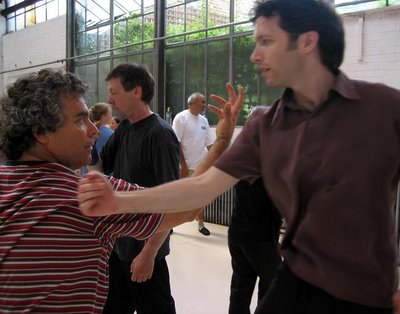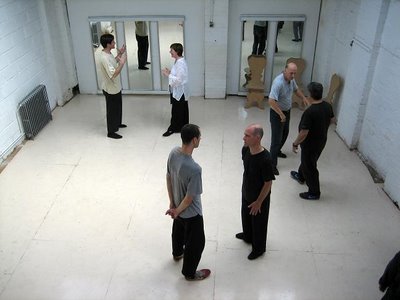sunlight after sex
first frost on the fells
a crystal apron dissolves
in a lap of certain light
water in a bedroom cup
cold clear
and the air sure
Tom Pickard
taking care of the world by sustaining the web of connexion
I have given up the “religious” which is nothing but the exception, extraction, exaltation, ecstasy; or it has given me up. I possess nothing but the everyday out of which I am never taken
in order to be able to go out to the other you must have the starting place, you must have been, you must be, with yourself
meaning is to be found neither in one . . . nor in both together, but only in the dialogue itself, this “between” which they live together
the genuinely thinking man must live through the feminine, the genuinely thinking woman the masculine; each must find the counterpole to his/her own order to allow the unity of spiritual life to develop from both

for Peter Gizzi
Inside us an ocean
a blue unlike any other
Words are my headache
My own nameless identity
touches everything
keeps me awake
Say it again
I don't see any sin in grief
The ink reveals you
The scale upholds you
Blue crimes in your eye
we can say that
borne on
instinctual stimuli
conjures up
something more
Fellow man, arise!
a change of air
distracts you
to look forever forward
to new holidays
tired
sap.
Let yourself be
this life-giving ocean
whether
sufficient grounds
and whether
I should be thinking too
much of myself
and forgetting
that most of you
are much
at home
between laymen and artists
no
mere
unasked
and who
like you
as best he can
differs
by his own specific means and methods
will surely grant
enough
respect
you are the trunk of the tree
On John's 60th birthday in 2000 I was due to visit him for Pushing Hands at 6pm and on the way from my flat on the Lower Clapton Road (Murder Mile as it was affectionately known) I stopped off at various shops to buy him a little present. Buying things for John is always difficult, especially since he hates celebrating birthdays, but I felt the 60th deserved something. Unfortunately I could find nothing suitable so I resigned myself to not getting him anything.
The last interesting shop on the Holloway Rd one passed before turning off to get to John's flat, which was then on Liverpool Road, was a picture framing shop I really liked visiting because the lady who owned the shop was very friendly as well as being very beautiful, so I decided to go in and buy a classy birthday card for him. Unfortunately on this occasion the lady was not there, instead there was a gay guy called David who always wore extremely tight turned-up jeans high off his ankles and high into his groin, and spoke with one of those lacquered gay voices – almost a lisp. As I was buying the card I noticed a series of smallish framed photographic portraits of famous movie stars on the far wall - Brando, Gregory Peck, Cary Grant, etc. One of them was Grace Kelly - John's favourite - a beautiful photograph. I said to David, "Is that Grace Kelly?" He replied that it was and he then told me a wonderful story of how in the 1970's he had worked as an electrician in the palace in Monaco and had met Grace Kelly and had become friends with her (she really missed speaking English apparently). When he finished working in the palace she gave him a large signed and framed photograph of herself and her children which he said he will treasure for the rest of his life. I was so charmed by his story that I bought the small portrait for John (even though it was, for me, a lot of money) and got David to wrap it up nicely. When John opened it I have never seen such surprise and delight in a persons face. He hung the picture on the wall by his bed.





Language is probably the most popular tool for communication.
Man has been using it for a long time.
Why then are there so many misunderstandings, breakdowns and disasters in our relationships with others?
We have developed the kind of knowledge that can put men on the moon, so why do we not feed the starving and heal the sick when we so clearly have the means to do so?
What is written large in society is only a reflection of the small in the ordinary relationships we experience.
The answer is, of course, that communication is man's most difficult problem, and the basic principles are not generally known.
Communication took place before words were invented.
Confusion arises when it is assumed that communication begins with words.
The foundation for any episode or cycle of communication takes place out of time, before words can possibly interfere.
Then we come up against the problem of definition, since each word means something slightly different to each person according to character, talent, conditioning and mood.
To be open to all this - the huge far-searching humanity of the other person - requires humility which itself requires the laying aside of self-indulgence.
This means basically that you have to lay aside fear in order to listen.
To at least know this is a start.
But without this we are bound to repeat our own history endlessly which is no way forwards in the process of deepening our understanding by learning life's lessons.
The chief quality of listening to the energy behind words or other modes of expression, is softness.
Hardness implies barriers of self-satisfaction, often at our success at bearing off fear in some situation or other.
This kind of pride often encourages abuse.
The activity of our thinking mind as it comes to our consciousness often works against listening.
Softness implies lack of motives, lack of meanness.
The meaning of what is being communicated must attract and stick, and also be allowed to stick.
The understanding comes from the seeping of each into the other.
Good intentions and good nature are no substitute for correct method.
Filling the other person and being allowed one's own filling, is what is required.
Without this nothing is ever perfectly communicated.
It is as if a thirsty person is never given enough to drink, so that he always remains thirsty - pretty soon thirst dominates his existence.
So it is with lack of softness, lack of appropriate or sufficient giving.
Needs become paramount, and dominate the dialogue between the various aspects of our own energy and other energies, so that our general awareness is lessened with a parallel lessening of our capacity to communicate.
The word most appropriate, in this context, is love.
The umbilical to our mother is our first channel of communication.
The exchanges after birth may be less palpable, but are they less important?
If they go totally wrong could we not die?
What could be more important than that?
But when communication is blocked, when love is blocked or reduced, then a small death - a lessening of life - occurs.
In the large, life is communication.
It is said "God is Love" meaning the creator is love, so how can the created be less than love, indeed how can the created be less than the creator.
When it is said that all is communication, it is another way of saying that all is love.
Listening is the gift you give, is the gift you take.
To embrace listening completely requires a process that is neither give nor take but steady with the energy of the natural process.
It is when the self invades that we have motive, we have gain and loss.
Consequently, it is the ridding of self that is the process of love.
It is significant that a man and woman together can create new life.
But so can any two people, or two entities.
This new life may not necessarily take a perfect shape, but it is just as tender and full of potential as a new-born baby.
The reverence we can feel at such a birth is a special commitment to the natural process we call life.
Where the heart moves, we should follow, and not the other way round.
This way the world of success and failure may be left behind.
This does not mean immediate or huge success will follow our efforts.
Each thing that seems to go wrong is an inspiration to renew our faith in the natural process.
These little failures can then feed the work of reducing rather than increasing, until the self is removed more and more so we can listen more and more, be more and more at one with our partner in communication, one with the natural process itself.
The word love says it all to those who can hear - that all is love.
John Kells London 13v01

1. 3 years learning to sink and relax (the various solo Forms plus oodles of Partner Work)After that one was ready to begin.
2. 3 years learning to become strong and let your energy out (Power Class)
3. 3 years learning lightness of spirit through the Dance of Vitality.
The closer the gaze gets to the ceiling
the more it entangles itself
in webs.